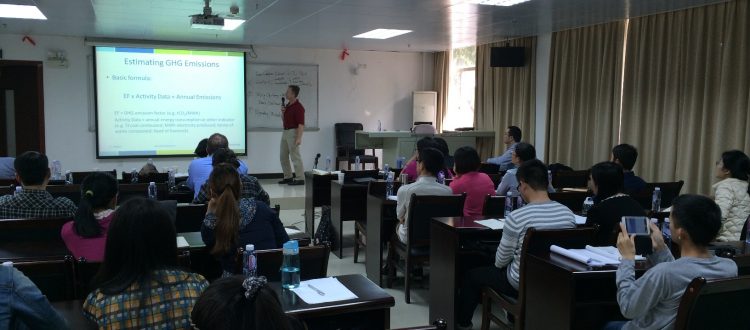Guangdong Aims for Low-Carbon Policy Development
JINAN (Mar. 26, 2014) – Guangdong Development and Reform Commission (GDRC) deputy director Lu Xiulu expressed his hope that the Low Carbon Policy Quantitative Toolkit jointly developed by the Global Environmental Institute (GEI) and its partners will be used to support the low carbon development of Guangdong province.
On March 25th and 26th, GEI project officers Yu Qingchan and Cui Nanying accompanied Center for Climate Strategies (CCS) chairman Tom Peterson and technology experts Steve Roe and Scott Williamson to conduct a technical discussion on “low carbon quantitative analysis methods” with experts from the Institute of Low Carbon and Sustainable Development at Jinan University.

The Training in Guangdong is underway – GEI 2014
During this time, GEI and CCS also conducted discussions with experts and leaders including GDRC deputy director Lu Xiu, head of the GDRC’s climate change response department Hong Jianwu, and vice-president of the Institute of Low Carbon and Sustainable Development at Jinan University Zhang Jie. Director Lu recognized the many achievements of cooperation between GEI, CCS, and other Chinese research organizations over the past few years. He also expressed his hope for the establishment of a long-term partnership of strategic cooperation between China and the U.S., to support low carbon development in Guangdong and across China.
The Chinese experts and leaders in attendance thought that the exchange yielded excellent results and recognized the U.S. methods and models for policy analysis as a useful reference. In particular, the potential to adapt the model by incorporating economic and energy characteristics specific to Guangdong, in order to provide effective policy recommendations for low carbon development in the region.
About the Low Carbon Development Project
In 2013, GEI cooperated with the Institute of Low Carbon and Sustainable Development at Jinan University (the main thinktank on low carbon economy policy for the Guangdong government), Chinese Academy of Science Policy Research Institute and other organizations to jointly undertake work related to the 13th Five Year low carbon development planning in Guangdong. This included the “Guangdong province low carbon and ecological culture development mechanism research” and “Guangdong low carbon development plan supplementary analysis” projects.
For the past few years, GEI and the Chinese Academy of Sciences Policy Institute have been using U.S. state-level climate policy methods to develop localized models for the “comprehensive low carbon policy quantitative toolkit”. The toolkit comprises two parts – a system for analyzing policy planning and a policy analysis tool – that have already been applied in the analysis of low carbon policies in Chongqing’s 12th Five Year Plan, and the economic impact evaluation of Guangdong’s carbon trading scheme.

